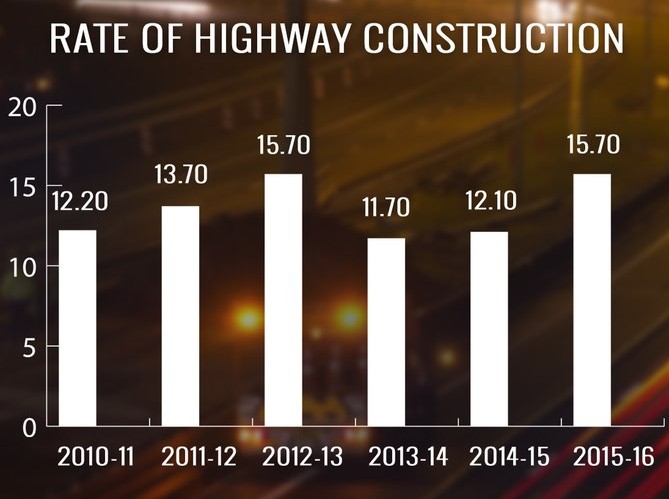An analysis by CRISIL on the pace of road construction
October 26, 2016
Annual highway construction
Year Distance
2011-12 2207 km
2012-13 2481 km
2013-14 1628 km
2014-15 1576 km
2015-16 2196 km
2016-17P 3040 km
2017-18P 4242 km
Pace of execution improves
8 months post awarding 12 months post awarding 18 months 30 months
2012-13 2% 3% 3% 41%
2013-14 9% 18% 39%
2014-15 5% 24%
Road projects : Full speed ahead
The speed of execution of projects awarded by the National Highways Authority of India (NHAI) improved 40% from an average 4.3 km per day in fiscal 2015 to 6 km in fiscal 2016. The material improvement in the pace of execution can be attributed to policy reforms by NHAI and facilitations by the government which are also reducing delays. The pace of execution is now expected to nearly double to over 11 km by fiscal 2018, propelled partly by execution of engineering, procurement, construction (EPC) projects awarded in the past three fiscals, according to research firm CRISIL.
However, even in the case of build, operate, transfer (BOT) and stuck projects, there has been some positive movement. For example, 15 NHAI projects were completed in the first four months of the current fiscal of which seven were BOT toll projects and four were awarded prior to 2009. CRISIL also analysed disaggregated data on execution for all projects awarded by NHAI during fiscals 2013, 2014 and 2015 at eight, 12, 18, and 30 months after awarding. Here too, the prognosis is encouraging with close to 25% execution taking place 12 months after projects were awarded in fiscal 2015.
The pace of execution of BOT projects awarded in fiscal 2013 has also ramped up to around 40%, 30 months since.
The key policy reforms initiated include easing of the clearances process, ensuring 80% land acquisition before the award of project, premium rescheduling, allowing developers to fully exit operational road projects, and introduction of the hybrid annuity model. Given that these reforms are largely aimed at reducing risk, CRISIL believes that private participation is set to pick up. Nonetheless, while the situation appears to be improving, there are still several BOT projects awarded between fiscals 2010 and 2012 that continue to be delayed, and are consequently viewed as high-risk projects.







